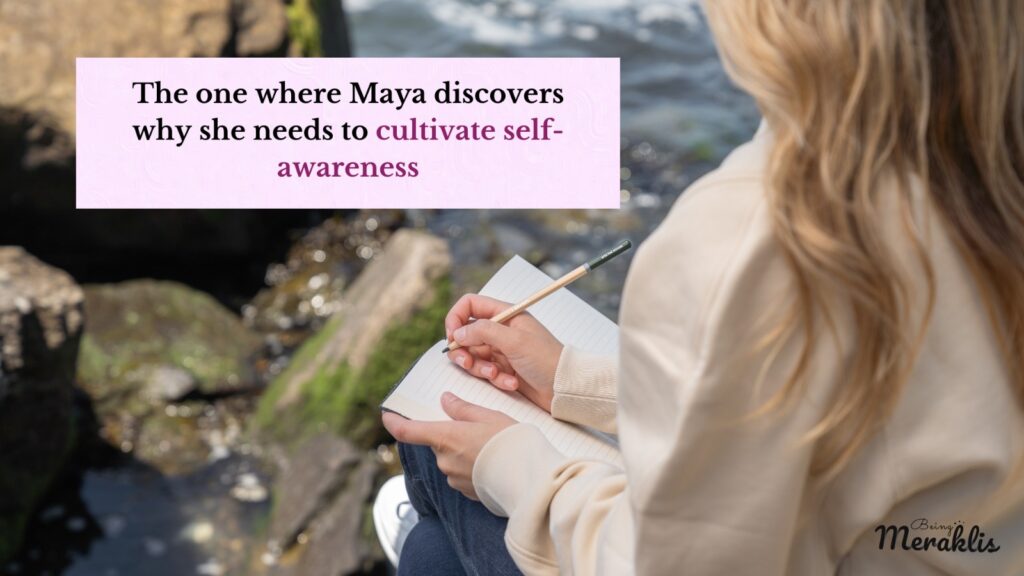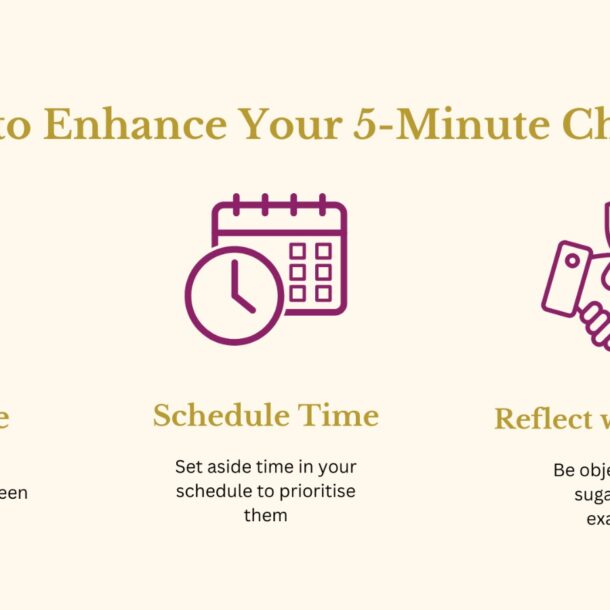The one where Maya discovers why she needs to cultivate self-awareness
Maya walked into Tara’s office one morning exasperated. She beseechingly looked at Tara and said, “What’s wrong with me, Tara? You’ve heard me go on and on for weeks and months now. You know my struggles. Even when I know better, I end up repeating the same old patterns and feeling bad about it. Why don’t you tell me, what’s wrong with me?”
Tara, slightly bemused by Maya’s frustration, gently enquired, “ Tell me Maya, do you go to a doctor and ask them to tell you what’s wrong with your body?”
Maya, visibly annoyed that she wasn’t getting a direct answer, folded her hands across her torso in dismay and replied curtly, “Of course not! How can a doctor know unless I tell them my symptoms?”
As she said the words aloud, she loosened up a bit, uncrossing her legs and opening her arms. Tara, noticing the shift in body language, asked her what was emerging for her.

Maya sheepishly admitted, “Well, Tara, I understood where you are going. You are pointing me to the fact that just like how I need to tell a doctor where it hurts and can’t expect a doctor to figure out what’s wrong with me, I can’t expect you as a coach to tell me what’s wrong with me. I get that.”
Tara nodded in agreement, “It’s true, Maya. I cannot tell you anything. I can only hold the space as you sit with the larger questions and find your own answers.”
The harsh truth is that whether or not you work with a coach, you need self-awareness.
You need to be able to observe what’s happening in your internal weather and articulate it. Of course, as a coach, I can help you refine it, drill down on the root cause, and stay with you as you process the emotions in the process of self-discovery, but you need to be able to point out the starting point.
Even Arjuna in the Gita despite being overwhelmed with grief and pain could exactly point out to Krishna where he was stuck. If you remember verse 7 in Chapter 2
कार्पण्यदोषोपहतस्वभाव:
पृच्छामि त्वां धर्मसम्मूढचेता: |
यच्छ्रेय: स्यान्निश्चितं ब्रूहि तन्मे
शिष्यस्तेऽहं शाधि मां त्वां प्रपन्नम् || 7||
Arjuna clearly states I’m confused about my dharma, and I see no victory. I’m anxious and faint-hearted. Please guide me on what’s best for me.
Maya, recollecting the verse and seeing it in the new light Tara referred to it, exclaimed, “How Specific! I get what you are saying Tara, you are telling me there’s no shortcut to self-awareness. That no matter how desperately I’m looking for a hack or a magic pill, I need to sit myself down and do the boring work of observing, analysing, experimenting, and then coming to my own conclusions.”
Tara chimed in, “Well, who says it has to be boring? Can you think of how you can make the process of cultivating awareness fun?”
Maya began to think out loud, “Well to cultivate awareness, I need to stop running at this pace. I need to slow down long enough to pause and understand what’s going on. Once I pause, I need to stop my natural tendency of looking outward for answers and learn to introspect, practice looking within. The next part is the hardest, analysing why I think the way I do or what belief makes me act a certain way. But I have you for that Tara, I can always talk it out with you to understand where my conditioned behaviour patterns are coming from and knowing you, you’ll invite me to reflect on what I’d like to do differently once I recognise the orgins and the consequences of my patterns.”
Tara chuckled with the realisation that coaches tend to become predictable when they work with clients long enough. Quickly recovering and donning her coaching hat, she prodded, “Alright, so what you’re saying is that you’ll Pause and Instrospect and bring your findings to coaching conversations to Explore and Choose Differently. But you still haven’t answered my question, what will make this fun for you?”
Maya thought about it and said, “I can make it like a fun game in my head. Rather than judging myself harshly for making mistakes or screwing up, I’m going to be playful and enquire about what I can learn about myself today.
That’s it. Instead of making personal growth and development some serious endeavour where I can’t be allowed to make mistakes, I’m going to make it playful as if I’m playing a game on my Nintendo. I can look at every day as if I have a new life and a chance to get better than my last attempt. I’m not worried when I lose a round in my Nintendo! Because I know I can restart and try again. That’s how I’m going to look at it.”
Tara mirrored the joy Maya felt in looking at life and growth through this new lens and reminded herself of the joys of self-discovery.
As much as we all want shortcuts, there are none when it comes to our lives. We need to cultivate self-awareness to recognise our patterns and keep showing up to do our best to rewire those that don’t serve us. For any meaningful change to happen, awareness is the first step.
Ask yourself, how can you cultivate self-awareness amidst your busy schedules? And how can you make it fun for yourself so it doesn’t feel boring?

